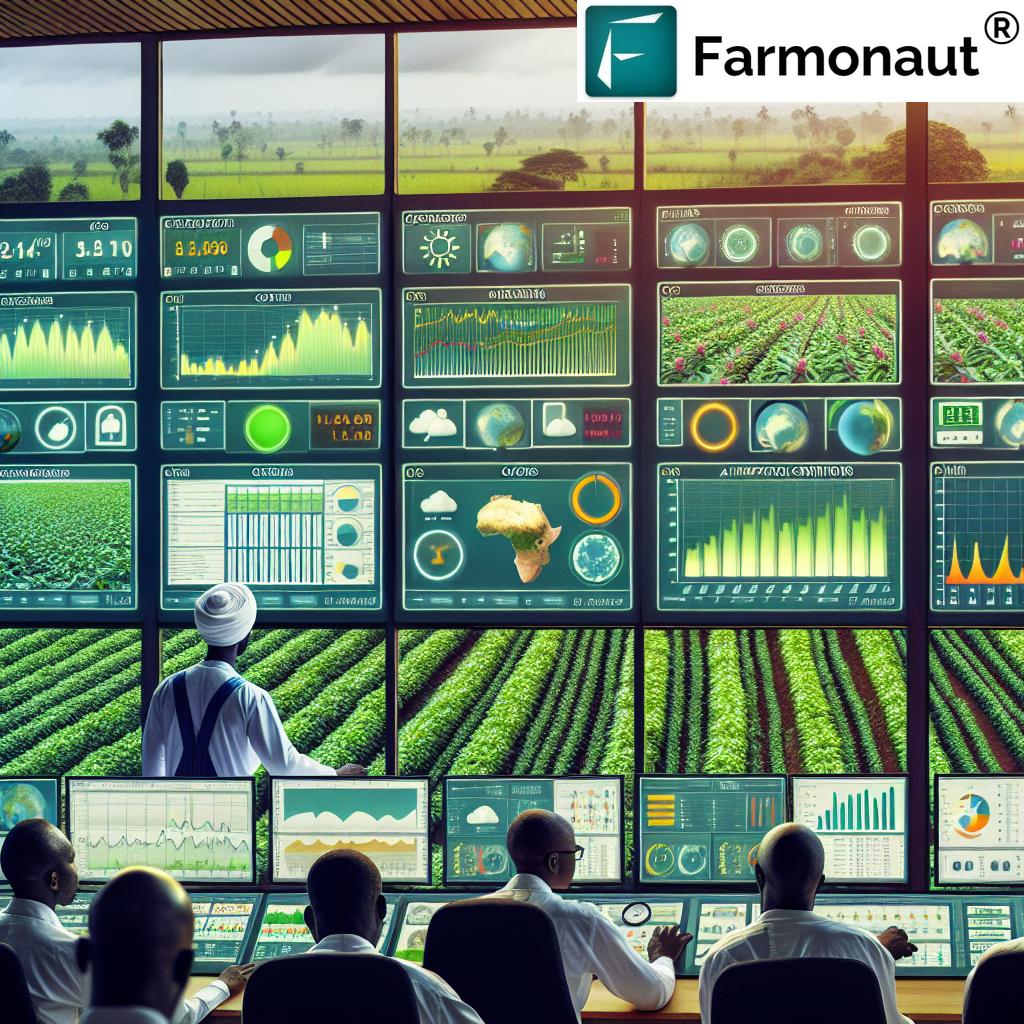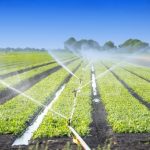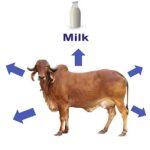Imagine having a crystal ball that could predict the perfect time to plant your seeds, tell you how much water your crops need, and even warn you about upcoming pest invasions. While it may sound like a scene from a science fiction movie, this is the reality of farming with big data.
If you’ve ever wished for a way to make farming decisions with more confidence and precision, you’re about to discover how big data is transforming the agricultural landscape. By harnessing the power of data, you can optimize your farm’s output, reduce costs, and increase your profits.
So, how exactly does big data help you make smarter decisions? Let’s dive in and uncover the secrets that could revolutionize the way you farm.

Role Of Big Data In Modern Agriculture
In today’s fast-paced world, the role of big data in modern agriculture is transforming how farmers make decisions. Imagine a farmer who can predict weather changes, optimize crop yields, and efficiently manage resources—all thanks to data. Big data is not just about numbers; it’s about turning information into actionable insights. By harnessing these insights, you can make smarter choices that benefit your farm and the environment.
How Big Data Enhances Precision Agriculture
Precision agriculture is all about making informed decisions based on data. With big data, you can track soil health, monitor crop growth, and even predict pest outbreaks. This information helps you apply the right amount of water, fertilizer, and pesticides, ensuring your crops thrive.
Imagine receiving a notification on your phone about a potential pest threat. You can act quickly and protect your crops, avoiding loss and saving money. This level of precision can make your farming more efficient and sustainable.
Using Data To Optimize Resource Management
Resource management is crucial in farming. Big data helps you use your resources wisely, whether it’s water, seeds, or labor. By analyzing data, you can pinpoint areas where resources are being wasted and adjust accordingly.
Consider the impact of knowing exactly how much water your crops need. Overwatering can lead to wasted resources and increased costs. With data, you can optimize irrigation systems, ensuring crops get just the right amount of water.
Insights For Better Crop Planning
Planning your crops effectively can make a big difference. Big data provides insights into market trends, helping you decide which crops to plant and when. Understanding these trends allows you to meet demand and maximize profits.
Picture yourself reviewing data that shows an upcoming demand for organic produce. You can adjust your planting strategy to cater to this trend, potentially increasing your revenue. This proactive approach gives you an edge in a competitive market.
Improving Sustainability And Reducing Environmental Impact
Sustainability is more than just a buzzword; it’s essential for the future of farming. Big data helps you minimize your environmental footprint by optimizing inputs and reducing waste.
Have you ever considered how much energy you could save by adjusting machinery usage based on data analysis? By reducing unnecessary energy consumption, you not only save money but also contribute to a healthier planet.
As you explore the benefits of big data in farming, think about how it can transform your operations. What decisions would you change if you had access to more data? The possibilities are vast, and embracing big data could be your key to smarter farming.
Enhancing Crop Management
Big data helps farmers by providing precise weather forecasts, soil analysis, and crop health insights. With this information, they can make better planting and harvesting decisions. This leads to improved yields and reduced waste, making farming more efficient and sustainable.
Enhancing crop management is at the heart of how big data is transforming agriculture. Imagine being a farmer who can predict the best time to plant, water, or harvest crops. This is not just a dream anymore but a reality, thanks to data-driven insights. By using big data, farmers can optimize their crop management strategies, leading to healthier crops and increased yields.Understanding Weather Patterns
Weather is unpredictable, but with big data, farmers can better understand and anticipate weather patterns. Access to real-time weather data allows you to make informed decisions about planting and harvesting. This data helps you minimize risks associated with unexpected weather changes, ensuring your crops thrive.Soil Health Monitoring
The health of your soil directly impacts crop yield. Big data provides detailed insights into soil conditions, including moisture levels and nutrient content. This information enables you to apply fertilizers and water more efficiently, promoting healthier crops and reducing waste.Pest And Disease Management
Pests and diseases can devastate crops if not managed properly. Big data helps in predicting pest and disease outbreaks by analyzing historical data and current conditions. With this knowledge, you can implement preventive measures, safeguarding your crops and your investment.Precision Agriculture Techniques
Precision agriculture leverages big data to optimize every aspect of farming. Using GPS and satellite imagery, you can monitor crop health and growth patterns. This precise information allows you to apply resources like water and pesticides only where needed, increasing efficiency and reducing costs.Yield Prediction And Optimization
Predicting crop yields is crucial for planning and financial stability. Big data analytics provides accurate yield predictions based on various factors like soil health, weather patterns, and crop type. With this foresight, you can plan better for market demands and ensure your farming business remains profitable.Resource Allocation
Efficient use of resources is key to sustainable farming. Big data aids in the optimal allocation of resources such as water, seeds, and fertilizers. This targeted approach not only reduces costs but also promotes environmental sustainability, making your farm more eco-friendly.Real-time Decision Making
In farming, timing is everything. Big data offers real-time insights that empower you to make quick, informed decisions. Whether it’s adjusting irrigation schedules or changing planting strategies, having access to timely data ensures you stay one step ahead in managing your crops. Have you ever considered how much data your farm generates daily? By harnessing this data, you can make smarter decisions that lead to better crop management and higher yields. How will you use big data to transform your farming practices?Optimizing Resource Allocation
Big data is changing the way farmers manage resources. It helps them make informed decisions. By analyzing data, farmers can use resources more efficiently. This not only reduces costs but also boosts yields. Let’s explore how big data helps in optimizing resource allocation.
Understanding Soil Health
Soil health is crucial for crop growth. Big data offers insights into soil conditions. Sensors collect data about moisture and nutrients. Farmers use this data to decide the right time for planting. They can also determine the best crops for their soil. This ensures better yields and healthier crops.
Precision Watering Techniques
Water is a valuable resource in farming. Big data helps in managing it wisely. Data from weather forecasts and soil sensors guide irrigation schedules. This prevents over-watering and under-watering. It leads to water conservation and healthier crops. Farmers can grow more with less water.
Efficient Fertilizer Use
Fertilizers are vital for crop nutrition. Using too much can harm the environment. Big data helps determine the exact fertilizer needs. Farmers analyze crop growth data to decide the right fertilizer amount. This reduces waste and costs. It also minimizes environmental impact.
Monitoring Pest And Disease Outbreaks
Pests and diseases can ruin crops. Big data helps predict outbreaks. Sensors and satellite images provide real-time data. Farmers can spot early signs of trouble. They can take action before the situation worsens. This protects crops and saves money.
Enhancing Equipment Efficiency
Farm equipment is costly. Big data helps in using it effectively. Data from machinery sensors show usage patterns. Farmers can schedule maintenance to avoid breakdowns. They optimize equipment use for different tasks. This extends equipment life and reduces costs.

Predictive Analytics In Farming
Predictive analytics is transforming agriculture by offering data-driven insights. Farmers can now forecast and plan with greater accuracy. This technology aids in understanding crop patterns and weather conditions. It helps in optimizing resources and minimizing risks. Let’s explore how predictive analytics shapes modern farming.
Understanding Weather Patterns
Weather greatly impacts farming success. Predictive analytics helps farmers anticipate weather changes. Farmers can prepare for droughts or unexpected rains. This ensures crops receive proper care at the right time. Better weather predictions lead to improved yields.
Optimizing Crop Production
Predictive tools analyze soil and crop data. Farmers know which crops will thrive in certain conditions. This knowledge boosts production efficiency. It also reduces waste and enhances sustainability. Crop health predictions ensure timely interventions.
Efficient Pest And Disease Management
Pests and diseases pose a threat to crops. Predictive analytics identifies potential outbreaks early. Farmers can take preventive measures in advance. This reduces crop loss and protects farm investments. Healthy crops lead to higher quality produce.
Resource Allocation And Cost Reduction
Farming requires managing various resources. Predictive analytics aids in efficient resource allocation. Farmers can save on water, fertilizers, and labor. This reduces costs and increases profitability. Smart resource use benefits the environment too.

Conclusion
Big Data transforms farming into a more precise practice. Farmers gain insights quickly. This helps with better crop yields and resource management. Data guides decisions about planting, watering, and harvesting. As a result, farms become more efficient and productive. Less waste.
More savings. Technology, like sensors and drones, gathers valuable information. This helps monitor soil, weather, and crop health. Farmers can address issues before they escalate. Big Data offers a path to sustainable farming. It supports farmers in feeding the world.
Smart decisions lead to healthier crops and better profits. Future farming is data-driven, efficient, and sustainable.



